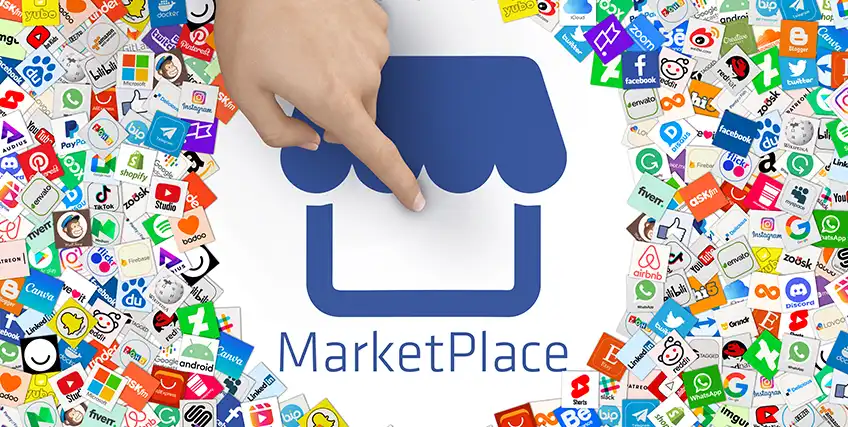How to Use E-commerce Funding Options to Scale on Facebook Marketplace
April 08, 2025 | Last Updated on: April 09, 2025

If you're looking to turn your side hustle into a serious income stream, e-commerce startups might be your golden ticket. Facebook Marketplace is one such example. Over 3 billion users browsing the platform monthly, it’s no longer just a place to sell used furniture or secondhand bikes, it’s become a powerful sales channel for online businesses and e-commerce entrepreneurs alike.
However, here’s the catch: growth on Facebook Marketplace doesn’t just happen. From inventory costs to advertising and logistics, scaling takes capital. That’s where e-commerce funding options come into play. With the right e-commerce financing for online Marketplace, you can move faster, reach more customers, and build a more sustainable business.
In this article, we’ll explore why Facebook Marketplace is a smart and accessible choice for e-commerce sellers, especially small business owners looking to grow. You’ll also learn how various e-commerce funding options can help you scale your operations with confidence.
Why Choose Facebook Marketplace?
The days of running an early-stage business by posting items in your neighborhood’s buy and sell Facebook groups are over. The latest way to use Facebook to drive sales is by utilizing Facebook Marketplace. This social media interface, designed to help individuals buy and sell household items, has created a unique opportunity for small business owners wishing to grow their companies. Facebook Marketplace is a feature within the app that offers a shop-like site, similar to eBay or Craigslist e-commerce companies. The social media site doesn’t facilitate sales, but it provides a platform for sellers to advertise, price, and coordinate shipping for their products.
Listing items or advertising your small business on Facebook Marketplace allows small business owners to connect directly with potential customers. The site can be used to list a variety of retail, new products or simply to advertise a local storefront. It costs nothing for people to shop on Facebook, so Marketplace can act as a vehicle for getting your brand in front of your target customer base. Unlike Amazon and eBay, Facebook allows small business owners to list their items or advertise their services for free. The business simply pays selling fees after the item has been shipped, typically 5% of the product price.
Some other advantages of using Facebook Marketplace for your small business include:
Global Exposure
Around 35% of the world’s population uses Facebook and Facebook Marketplace, which equals about 2.9 billion users each month. The popularity of Facebook all over the world means that entrepreneurs that choose Marketplace as a sales platform, have instant access to a large international audience.
Marketing Tools
Using Facebook Marketplace as a tool to grow a small business gives the user access to different marketing tools to reach their target audience through the platform, like the merchant selling feature. Using these marketing tools helps your message reach more people and enhance supply chain which can translate to more revenue. There are also marketing tools like Facebook Ads, Sendinblue, and Hootsuite that are designed specifically for e-commerce businesses connecting through Facebook.
Flexible Payment Methods
Small business owners that choose Facebook Marketplace as a sales platform do not have to worry about a separate source for collecting credit card payments. Since Marketplace doesn’t have a preferred transaction service, businesses are free to accept any payment method including PayPal, Shopify, BigCommerce payment processing, direct bank transfers, or cash.
Directly Reach Prospects
Selling your small business’s goods and services on the Marketplace lets the business owner communicate directly with customers and potential buyers. The personalized platform allows the entrepreneur to control the information that is reaching the public and connect with new customers by using search engine optimization (SEO) keywords on their page. Each visitor or commenter on Marketplace is considered a future customer.
Benefits of E-commerce Funding Options for Small Businesses
Many entrepreneurs don’t realize that they have e-commerce funding options available for their Facebook business page. The truth is there are many small business loans for Facebook sellers and other E-commerce businesses. If you’re not sure whether e-commerce funding options can help you grow your Facebook business or e-commerce store, check out these common reasons to explore financing for online Marketplace.
- Startup costs: Business loans for Facebook Marketplace can help small business owners design their websites, online stores, or fund their advertising campaigns. While Facebook provides many free resources and options for merchants, there are still some costs associated with starting any new business.
- Purchasing inventory: If you are selling tangible products through your Facebook Marketplace store, you will need to purchase a significant amount of beginning inventory. Without the right e-commerce funding options, you risk launching your business only to find you can’t fulfill orders, costing you valuable long-term customers.
- Expanding operations: E-commerce funding options really help entrepreneurs that want to take their Facebook businesses to the next level. Whether your goals include exposure to a large retail store or hiring a manufacturer, financing can give you the capital you need to make the change.
- Navigating revenue fluctuations: Starting any business is tough. One of the most common challenges for new business owners is navigating cash flow fluctuations resulting from slow periods or seasonal sales trends. Various e-commerce funding options can give your business extra working capital to cover expenses during times of low revenues.
Types of E-commerce Funding Options
There are many different types of financing options for Facebook Marketplace entrepreneurs. Deciding which business funding option is best for you depends on your lender preference, credit history, business plan, and business needs. Term loans and SBA loans seem to be the most popular with small business owners operating on Facebook, LinkedIn, eBay, and other e-commerce platforms because of their flexible repayment terms. Other financing solutions that work well for Facebook entrepreneurs are a business line of credit, working capital loan, or merchant cash advance.
Below are some of the most popular e-commerce funding options used by online sellers, including both traditional bank loans and alternative business financing methods:
Term Loans
Term loans are one of the most widely used funding solutions among e-commerce business owners. With a term loan, you receive a lump sum of loan amount upfront in your bank account and repay it over a set period, typically with fixed monthly payments. Interest rates can be fixed or variable, and repayment schedules may range from one to five years.
This e-commerce funding option is ideal for planned investments, such as inventory expansion, launching paid ad campaigns, or upgrading your fulfillment process. However, qualifying for a term loan often requires solid eligibility for credit scores and business financials.
SBA Loans
Backed by the U.S. Small Business Administration, SBA loans are highly sought after due to their lower interest rates and favorable terms. These loans are issued by approved lenders but partially guaranteed by the government, which reduces risk for the lender.
SBA loans as an e-commerce funding option are well-suited for major investments like purchasing equipment, securing a warehouse space, or funding large marketing initiatives. That said, the application process can be lengthy, and many Facebook Marketplace sellers may not qualify if they haven’t been in business for at least two years.
Business Lines of Credit
A business line of credit offers flexible access to funding. Think of it like a credit card, you get approved for a maximum amount and only pay interest on the funds you use. This e-commerce funding option is great for managing cash flow, covering seasonal dips in revenue, or funding short-term needs like advertising boosts or bulk inventory purchases.
Working Capital Loans
Working capital loans provide quick funding for everyday business expenses like supplier payments, shipping costs, or software subscriptions. They’re a useful tool for sellers who need to stabilize cash flow or cover gaps during slow sales periods. These loans tend to be short-term and may come with higher interest rates, but they’re often easier to qualify for.
Merchant Cash Advance (MCA)
An MCA isn’t technically a loan, but rather an advance against your future sales. The lender gives you a lump sum, which is repaid automatically as a percentage of your daily or weekly revenue. This method is best for high-volume sellers with strong, consistent sales on Facebook Marketplace.
While MCAs are fast and accessible, even for those with bad credit, the cost of borrowing can be much higher than other options. They're best used when you need funds immediately and are confident in future sales.
Revenue-Based Financing
Revenue-based funding solutions are an increasingly popular option for e-commerce businesses. With this model, lenders provide upfront capital in exchange for a fixed percentage of your future monthly revenue. Payments fluctuate based on your sales performance, so if you make less, you pay less.
This type of funding aligns well with e-commerce businesses that have fluctuating sales, like those running Facebook Marketplace stores. It also doesn’t usually require personal collateral, making it accessible to many growing sellers.
Crowdfunding
Crowdfunding platforms like Kickstarter or Indiegogo allow you to raise funds directly from your target audience. Instead of repaying with interest, you typically offer backers a product, reward, or early access in return for their support.
Crowdfunding works best when you have a unique product or strong brand story to share. It’s also a great way to validate your product idea before investing heavily in marketing or inventory. While it takes planning and effort to run a successful crowdfunding campaign, it can provide a powerful boost without adding debt.
Angel Investors
If you have a high-growth business model and a clear path to profitability, you may consider pitching to angel investors. These individuals provide capital in exchange for equity financing in your business. In addition to funding, angel investors often bring valuable connections and mentorship.
This route is better suited to e-commerce sellers looking to scale aggressively or eventually launch a product line beyond Facebook Marketplace. Keep in mind that giving up equity means sharing control over certain business decisions.
Final Thoughts
Starting your own business can feel overwhelming, but you don’t have to navigate it alone. Whether you're growing a presence on Facebook Marketplace or launching a full-scale online store, the right e-commerce funding options can help you scale faster and smarter. With access to the right capital, you can invest in inventory, streamline your operations, and boost your marketing efforts. Don’t let a lack of funds hold you back, there are solutions out there designed to meet your unique needs.
Ready to take the next step? Get in touch today to explore flexible financing solutions that support your business goals.
Frequently Asked Questions About E-commerce Funding Options
Can I get a business loan for selling on Facebook Marketplace?
Yes, many lenders offer small business loans and e-commerce funding options that can be used to support your Facebook Marketplace store. These funds can help with inventory, advertising, website development, and managing cash flow.
Do I need a registered business to apply for e-commerce financing?
In most cases, yes. Lenders typically require proof of business operations, which may include a business license, EIN, tax documents, or financial statements. However, some revenue-based and crowdfunding options are available to early-stage businesses.
Is Facebook Marketplace a reliable platform for e-commerce growth?
Yes. With over 1 billion monthly users, Facebook Marketplace offers global reach, built-in marketing tools, and direct access to potential customers. It’s free to list products, and the platform supports flexible payment methods, making it ideal for small businesses.
How can I increase my chances of loan approval as a Facebook seller?
To improve approval chances, maintain accurate financial records, build business credit, clearly outline your business plan, and choose the right type of financing that matches your current revenue and stage of growth.
What’s a good advantage of using e-commerce funding options for Facebook Marketplace?
A good advantage of using e-commerce funding option is speed and scalability. With the right funding, you can move faster investing in ads, inventory, tools, and marketing that help you stand out and generate consistent revenue.




